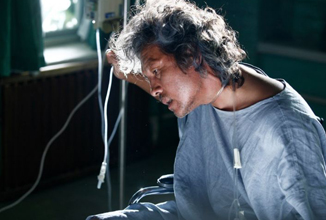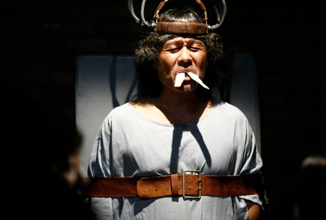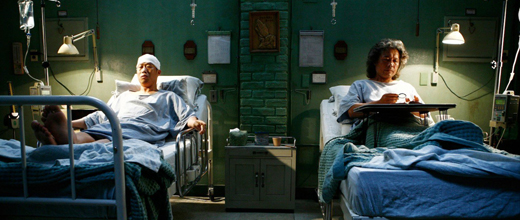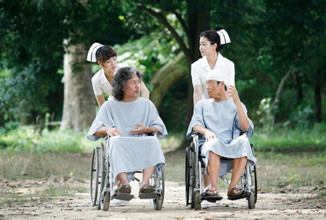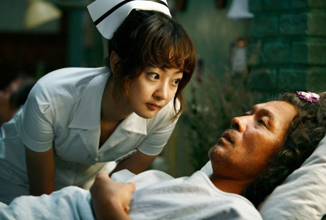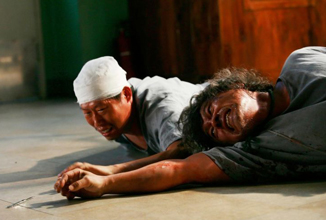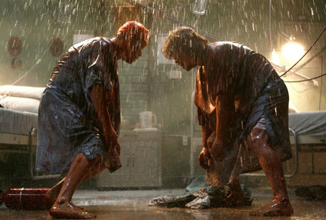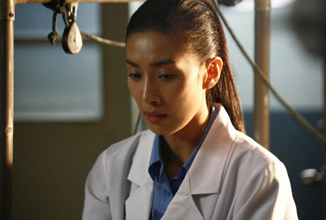
 |
||||||||
Synopsis: A stroke having paralysed the left side of his body, Min-ho (Cheon Ho-jin) lies in hospital with one wish, and one wish only, filling his every waking moment: Min-ho is desperate to die. Resolutely determined to commit suicide by whatever means necessary, be it by way of a pills overdose or by throwing himself out of his wheelchair and off a cliff, no amount of life-affirming pep talks from nurse Ha (Seo Hyo-rim) or repeated, enforced electro-therapy can divert him from his quest.
That is, until Sang-eob (Yoo Hae-jin) is admitted to the hospital - an accident having left him also temporarily paralysed as well as stripped of his memory - and placed in the adjoining bed. Recognising Sang-eob from the past, Min-ho's thoughts immediately shift from suicide to murder, but as Sang-eob's memory begins to return his focus too turns to homicide and the question quickly becomes which of the two men will ultimately succeed in killing the other... and why...
Review: Even without reading the above synopsis, it'll be pretty obvious to most that a film with the English title of Desire to Kill (or even the alternative title of Enemy at the Dead End) is likely to contain a fair amount of violence, but in classic Korean cinema genre-bending style, the increasingly brutal and ingeniously inventive endeavours of Min-ho and Sang-up to kill each other are not simply provided as violence for the sake of violence within a story of revenge. For here we have a film that is - for the majority of the running time - a genuinely funny black comedy, come mystery, come psychological thriller that moves fully into revenge territory to reveal the real state of play only once the final blood-soaked showdown has taken place, with the majority of the narrative deliberately holding back the "why" of the men's murderous intentions in favour of the "how".
Considering the fact that violent tales of revenge are pretty much two-a-penny in almost any country you could care to mention, not least Korea, the decision to base the scenario of Desire to Kill around two semi-paralysed, almost bed-ridden, characters who can barely move is both original and, frankly, inspired, serving to set the dark yet humorous tone perfectly from almost the outset while Min-ho and Sang-eob's utter glee at not only the pain and suffering they inflict but also the sheer annoyance their actions cause underlines this further - almost guaranteeing to keep a smile consistently on viewers' faces until the conclusion of the film finally reveals its dark secrets. Thematically, Desire to Kill ticks all the boxes you would hope and expect, the commentary centring on the idea of "As you sew, so shall ye reap" with added references to patriarchy and misogyny alongside the contrasting of archetypal blinkered male attitudes to women with the still changing place of women within society, and even briefly pointing to the feelings of women themselves as to where they fit in and how they deserve to be treated.As is the case in a veritable plethora of classic Korean films, the wrapping of some fairly serious themes within a quirky, humorous narrative ensures that there is never any feeling of being preached at or lectured and while the themes in Desire to Kill are largely stated rather than dissected, their position underlying the narrative allows the film to succeed both on a surface entertainment level and as something more for those who choose, or want, to look a little closer.
The one area, however, that concerns me somewhat (as is the case with any, and all, Korean films featuring high amounts of violence) isn't regarding the film itself but how Desire to Kill will be perceived in the West by those who haven't yet seen it.
Plus, no sooner is the word violence mentioned in connection to a Korean film than seemingly huge swathes of the British press, Western journalists and writers seem to have light bulbs flash on and off in their heads making them immediately think "Violence?... Korean film?... Oh, I know, let's compare it to Oldboy... No-one else will have thought of that or done it endlessly before." While this too is understandable, to a degree, it speaks (to me, at least) of either laziness, an utter lack of knowledge of any Korean films bar the most famous or a rather presumptuous assumption that Oldboy is the only Korean film that Korean film fans in the West have ever heard of. Summary: Desire to Kill references some fairly serious social themes within a quirky and genuinely funny black comedy come psychological thriller, accenting and underlining each with copious amounts of bloody violence throughout. Just don't, whatever you do, be as lazy as to compare it to Oldboy.
I'd also sincerely like to thank all those at Terracotta Distribution for supplying me with a screener of Desire to Kill for the purposes of this review. |
||||||||
All images © Terracotta Distribution and Funch Ball Review © Paul Quinn |
||||||||
